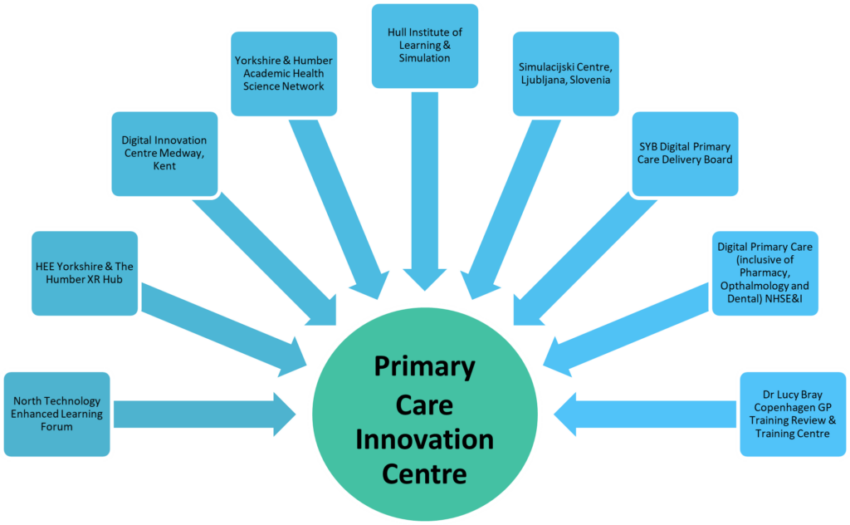1 June 2022
Welcome back to the blog!
By this point I hope that you dear reader are beginning to form a picture in your head about what this might look like. We’ve talked about a physical space and what that represents and the principles on which we want to achieve our aspirations but a key factor in the success and the difference between this concept and several others is the focus on technology.
So, let’s explore that!
I want to be able to test out the use of things like Virtual, Augmented and Extended Realities to enhance the learning experience, to test out whether you can evoke a physical and emotional response in order to create a lasting memory enhancing and increasing the amount of learned and retained information.
So, what does that look like??
The Kate Garraway programme shows us a glimpse of what this technology can do; it’s potential applications in healthcare are vast and in training, just as incredible.
Imagine learning how to do a procedure in primary care as an undergraduate nurse on an actual person! Added to that, very real time pressures, the anxiety of the patient, being in a new, unfamiliar environment, the thought of hurting a patient or doing it wrong! Now think about having a virtual patient, one who will react to you and your actions but one out of the practice, removing the added pressure and anxiety that causes and being able to press a reset button. No wasted consumables or pressure on appointments and all in a clean and safe environment.
Using such technology as the RiVR headsets, we can run simulations online with up to 35 students either together in one room or some may be at home or in practice, each with a headset fully immersed in the scenario. They can make decisions and take actions which would affect the outcome of the situation. All fully controlled by an educator/instructor and communicating with the students all the way through.
Some headsets are pre-loaded with scenarios from companies like Oxford Medical Simulation who create very realistic, real time reactionary scenarios that help to train students in relevant topics. I’ve been able to see these in action; I had a demonstration with a nurse colleague on the topic of anaphylaxis and I watched that experienced nurse react physically and emotionally as the patient went into decline in real time during the demonstration. That was powerful!
I’ve also been working with Keele University with one of our Stakeholders Joe Vere from the Dental Deanery at HEE and one of the Hub’s Health Inequalities leads Blerta Ilazi to create 2 bespoke patient Avatars! These avatars are web based and allow leaners to have dialogue on a specific topic as they would with a patient, it affords the learner the ability to practice that consultation over and over without limits. The avatar will react to the discussions had with them and will even provide the learner with feedback at the end of the scenario! How amazing is that!? The applications for use of this type of tool are endless but particularly we feel of benefit to anyone training for an OSCE (Objective Structured Clinical Examination). The chosen topics of the 2 avatars we’re working on are:
The opportunity to experience a consultation where there is the potential to identify a patient suffering from modern slavery will more than likely never present itself but it’s something everyone needs to be ready to do; therefore, we are exploring the possibility of how to design this avatar interaction tool in such a way that it would count towards clinicians receiving their Safeguarding Level 3 certificate!
Meet Brian Smith! He’s a patient avatar!
Some fantastic partnerships are being forged on this journey, particularly in this area of focus!
I am particularly excited at the potential to partner up with the Digital Innovation Centre in Medway Kent who were set up originally to provide health and social care training to Care homes but have since begun to expand their offer of training to a wider audience. I’d like to see if we can work together do some multi professional learning with our care home colleagues in South Yorkshire!
So far, I have successfully linked in with:

Click on the links for further information:
Digital Innovation Centre Medway, Kent
Yorkshire & Humber Academic Health Science Network
Hull Institute of Learning & Simulation
Simulacijski Centre, Ljubljana, Slovenia
I’m incredibly excited to see how we harness this technology! I’d like to think that adopting the use of digital solutions and modern technologies for training, whether that’s with students at the start of their careers or as CPD to existing Primary Care Colleagues that we demystify it and create a culture of being ‘comfortable’ with accepting and adopting new technology.
In July’s edition I hope to share with you how we plan to create a testing centre. This will enable us to test our hypotheses, test the technologies and their suitability for Primary Care training and to evaluate if we have the correct model for delivery.
Thanks for logging in!
Liz